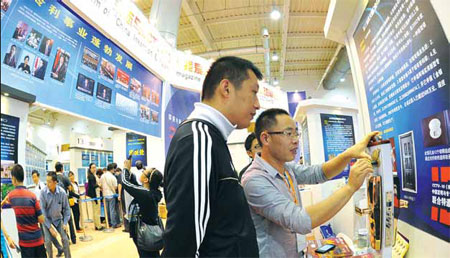Patent fair brings ideas to life
|
An exhibitor explains his company's patented light-controlled lock to visitors at the fair in Dalian. Chen Debin / for China Daily |
For Cui Yongzhu, a professor specializing in textiles at Dalian Polytechnic University, it was a familiar talk as he described his breakthrough for processing cashmere and wool using chitosan, a substance extracted from the exoskeleton of crabs and shrimp.
But this time his presentation was not to students in a school lecture hall, but face-to-face with visitors at an exhibition booth at the China International Patent Fair in Dalian, Liaoning province from Sept 15 to 17.
"Processed with chitosan, the clothes have good anti-bacterial quality," Cui told interested groups of fair participants.
The patented technology has been industrialized at factories in Liaoning and Shandong provinces, but Cui is trying to find more partners. That's why he attended the fair, he told China Daily.
Yet not every inventor thinks his creation will soon become reality. Xie Xiangyong, owner of three patents, said he did not expect find a partner at the fair, but came so more people know about his ideas.
His latest patented invention is a public traffic system with conveyer belts. People walk onto the belt at one station, take seats, and walk out at their destination.
"With more people choosing to use the system, there would be less traffic jams," Xie said. "But I surely know that without government support, it is impossible to turn into reality."
Xie said many visitors have showed an interest in his project. "That is enough at present. Rome wasn't built in a day," he said with a smile.
Also using an age-old saying, Peng Baoxiang, vice general manager of the China Patent Development Corp under the State Intellectual Property Office, noted "not all eggs can be hatched into chickens".
Industrialization of patents is complicated and difficult, Peng admitted.
"A patent means innovation but that doesn't mean its technology is mature. Also, the conditions for commercialization may not be ripe," he explained.
With the theme of "innovation and creation", the fair exhibited the latest patents in various fields, especially in the environmental protection and high-tech sectors.
Sponsored by SIPO, the Liaoning provincial government and the China Council for the Promotion of International Trade, the event attracted more than 3,000 enterprises, universities and research institutes.
On the first day of the fair, 10 companies signed cooperative agreements for five projects worth 350 million yuan ($55.4 million) involving technologies ranging from electronic information to computerized control, equipment manufacturing, new materials and bio-technology.
Over the past seven sessions of the fair, more than 70,000 patents have been displayed, over 8,000 companies have participated and more than 700,000 visitors from 30 countries and regions have attended the annual event. It has become a State-level patent fair with the highest standards and the most influence in China, said SIPO Commissioner Tian Lipu.
"It has played an important role in promoting commercialization and industrialization of patents, cultivating and developing high-tech products, and pushing forward the change of the economic development model," Tian said.
The host city Dalian has also benefited, now named a National IP Model City for the nation. It is a magnet for patented technologies and products from both home and abroad, said local authorities.
Both patent applications and approvals have increased substantially in the city in recent years, said Qu Xiaofei, deputy mayor of Dalian.
In 2011 alone, more than 16,000 patent applications were filed from Dalian, ranking it first among the northeastern cities for the eighth consecutive year.
zhangxiaomin@chinadaily.com.cn



















